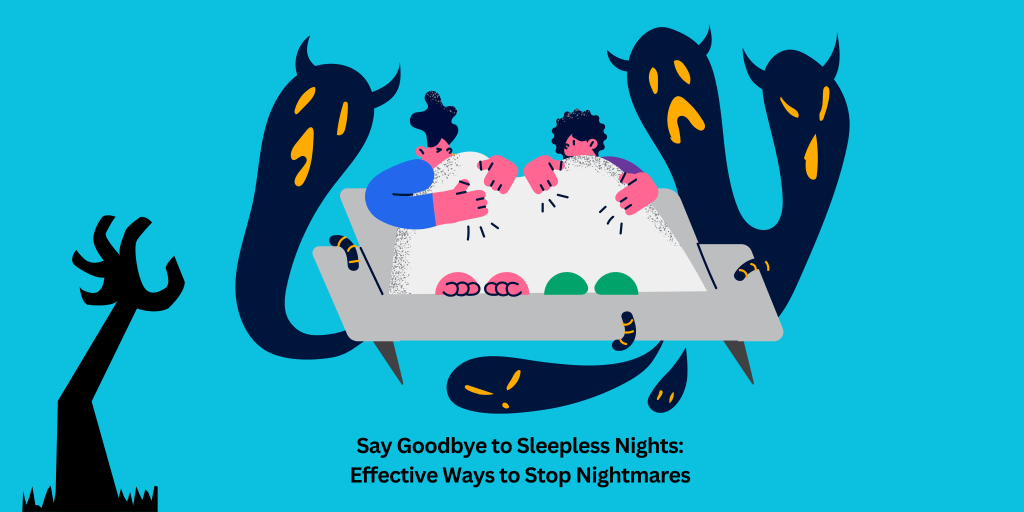
Nightmares can be frightening experience that disrupts our sleep and has an impact on our daily lives. They can cause stress, anxiety, and fear, making it difficult to fall asleep or sleep well. If you have nightmares, you might be wondering how to stop them.
In this article, we will look at various tips and strategies to help you stop nightmares and sleep peacefully.
Tips to stop nightmares
Nightmares can be a scary and unsettling experience. They can leave you feeling anxious, scared, or even exhausted. But don’t worry – there are ways to help reduce the frequency of nightmares and get better sleep.
1. Identify the source of your nightmares
The first step is to identify what may be causing your nightmares in the first place. Stressful events, traumatic experiences, medications or drugs, and even certain foods can all contribute to bad dreams at night.
There are several things that might trigger nightmares, including:
- anxiety and tension
- Post-traumatic stress disorder or trauma (PTSD)
- Medications
- sleep problems
- abusing drugs
- Certain medical conditions
Once you have identified any potential triggers for your nightmares it is important that you take steps to address them as best as possible so that they do not continue to haunt your nights anymore!
2. Practicing relaxation before bed
One way of reducing nightmare frequency is by practicing relaxation techniques before bedtime such as deep breathing exercises or progressive muscle relaxation (PMR).
This will help calm both body and mind which can lead to more peaceful sleep with fewer disturbances from unwanted dreams during the night.
In order to calm down, you can try out a few different methods, such as:
- Yoga
- meditation for deep breathing
- Muscle relaxation
- directed imagery
Additionally, if stressors are contributing factors then it might also be helpful for you to try out some mindfulness activities like journaling or meditation throughout the day in order to manage these feelings better before going off into dreamland at night!
3. Making changes in your sleeping environment
Another way of tackling this problem could involve making changes in your sleeping environment such as using blackout curtains/blinds so that no light enters while sleeping;
Some of the things that you can do to create a relaxing sleep environment include:
- Keeping the space quiet and dark
- Using soft cushions and bedding
- Keeping the room at a cool temperature and refraining from using electronics before bed
- Setting up a comfortable temperature;
- avoiding screens an hour before bedtime;
- listening to calming music/sounds etc.,
All of these should promote restful sleep without any interruptions from unpleasant dreams during slumber time!
4. Talk about any worries with someone close
Sometimes our nightmares are linked to a fear of something we don’t want to discuss. In these situations, it may be beneficial to confide in someone close to you and express any concerns or anxieties you may have.
Talking about such things can help put them into perspective and lessen the intensity of the nightmare when it occurs.
5. Exercise regularly
Exercising on a regular basis has been found to lower levels of stress and enhance the quality of sleep. This is due to the fact that engaging in physical exercise results in the release of endorphins, which aid to calm not only the body but also the mind.
Thus, if you want to get rid of nightmares for good, you might consider incorporating more physical activity into your regular routine.
6. Seek professional help
If you feel as though none of the tactics presented above are helpful, it may be time to look for assistance from a trained professional.
Your doctor or a therapist can help you identify any underlying psychological difficulties that may be the cause of your nightmares and provide you with specific suggestions on how to cope with them. This can be helpful in determining whether or not your nightmares are caused by such issues.
7. Keep Triggers away
The key to preventing nightmares is avoiding the triggers that can lead to them. Avoid common triggers like the plague, such as:
- watching spooky films or television programs before bed
- eating large meals just before sleeping
- drinking alcohol or caffeine right before bed
- using electronics before going to bed
8. Make sure you get enough restful sleep each night
You should get enough restful sleep each night. Try to keep a regular sleeping schedule and ensure that you are getting 7-8 hours of quality sleep every single night.
Distractions like laptops and phones should ideally not be used in the bedroom. This should lessen the likelihood of nightmares by helping your body and mind get ready for a restful night of sleep.
Can you get medication to stop nightmares?
Medication can be prescribed in some cases to help reduce the frequency and intensity of nightmares. It is important to note, however, that such medications are typically only prescribed when the nightmare becomes so intense or frequent that it interferes with daily life.
As a result, consulting with a doctor before taking any medication is critical in order to determine the best course of action. It is also suggested that you try the other methods listed above before resorting to medication as a last resort.
In any case, keep in mind that nightmares are usually brief and that there are several effective ways to deal with this problem!
What to eat before bed to stop nightmares?
Eating is an important part of sleep and can affect the quality of your sleep. Certain foods that are consumed before going to bed can help reduce nightmares because they relax the body and mind.
So here is the food better not to eat before bed:
- Snacks with added sugar and alcoholic beverages.
- Coffee and energy drinks are examples of caffeinated beverages.
- Foods that are spicy or greasy.
Instead, try to eat before bed:
- Bananas contain magnesium, which aids in muscle relaxation.
- Melatonin-rich almonds can help regulate sleep cycles.
- Oatmeal is a complex carbohydrate that aids in the production of serotonin and the reduction of anxiety.
- Tryptophan, an amino acid that promotes relaxation, is found in dairy products such as yogurt and milk.
- Herbal teas, such as chamomile or lavender, can help to reduce stress and improve sleep quality.
- Fruits with antioxidants, such as cherries and kiwis, can help you relax your body and mind.
- Fish high in omega-3 fatty acids promotes restful sleep.
You can reduce your chances of having nightmares by avoiding certain types of food before bedtime and eating a well-balanced, healthy diet. You can have a peaceful night’s sleep free of nightmares with the right combination of food, physical activity, and relaxation techniques!
How to stop nightmares when pregnant?
Nightmares are common during pregnancy and can be caused by a number of factors such as hormonal changes, psychological stress, or physical discomfort.
Fortunately, there are a number of strategies you can employ to reduce the frequency and intensity of nightmares while pregnant, including:
- Eat a well-balanced diet that is low in spicy and greasy foods.
- Exercise on a regular basis to help reduce stress.
- Before going to bed, use relaxation techniques such as deep breathing or yoga.
- Avoid watching intense or frightening movies before going to bed.
- Keep the bedroom clutter-free and dark in order to maintain a relaxing sleep environment.
- Consult your doctor if your symptoms persist or worsen.
You can help reduce your chances of having nightmares while pregnant by following these tips! Also, if you are concerned about the frequency or intensity of your nightmares, consult a healthcare professional. They can offer additional advice and assistance in dealing with them.
Is it normal to have nightmares every night?
No, having nightmares every night is not normal. While nightmares can be a symptom of an underlying mental health condition or the result of a traumatic event, they are typically episodic and do not occur on a nightly basis.
If you are having nightmares every night, you should consult your doctor. To address the underlying cause of your nightmares, they may recommend counseling or cognitive-behavioral therapy.
Nightmares can be upsetting, but with the right treatment, you can learn to deal with them more effectively. Speak with your doctor to learn more about your treatment options.
Are there any treatments for nightmares?
Yes, there are treatments available to help reduce the frequency and severity of nightmares.
CBT is one of the most effective forms of treatment because it helps people identify and address the underlying cause of their nightmares.
Medications can also be used to reduce the frequency and intensity of nightmares, but only under the supervision of a doctor.
Psychotherapy, hypnosis, biofeedback, relaxation techniques such as deep breathing or mindfulness meditation, and lifestyle changes such as exercise or yoga are some other treatments for nightmares.
Whatever treatment you choose, the most important thing is to discuss it with your doctor. They can collaborate with you to determine the best approach for managing your nightmares and assisting you in finding relief.
How to stop nightmares in kids?
Nightmares in children can be distressing, causing anxiety, difficulty sleeping, and irritability.
Parents should do the following to reduce the frequency and intensity of their children’s nightmares:
- Create and stick to a relaxing bedtime routine.
- Encourage your child to express any concerns or fears they may have before going to bed.
- Encourage your child to discuss any nightmares with their friends or teachers.
- Reduce your screen time before bedtime.
- Remove all light sources from your child’s bedroom.
- Consider using calming essential oils in the bedroom, such as lavender or chamomile, to create a more relaxing atmosphere.
If your child continues to have nightmares on a regular basis, you should consult with their doctor. They can suggest additional treatments or therapies that may benefit your child.
How to stop nightmares in toddlers?
Nightmares in toddlers can be especially distressing because they may not be able to fully express what is going on or find ways to cope with the associated fear and anxiety.
To reduce the frequency and intensity of their child’s nightmares, parents should do the following:
- Create and follow a bedtime routine that includes relaxing activities like reading or listening to music.
- Encourage playtime and imaginative activities during the day to help reduce anxiety at night.
- Remove all sources of light from their bedroom.
- Consider using calming essential oils like lavender or chamomile in the bedroom to create a more relaxing atmosphere.
- Avoid exposing your toddler to potentially frightening media before bedtime.
- Relaxation techniques such as deep breathing and progressive muscle relaxation should be encouraged.
All of these methods can assist your toddler in reducing the frequency and intensity of their nightmares. If your child’s nightmares persist, you should speak with their doctor about additional treatments or therapies.
How to stop nightmares in the elderly?
Nightmares in the elderly can be especially distressing, leaving them anxious or scared.
It is critical to remove as many sources of stress, fear, and anxiety from the elderly as possible. Limiting exposure to potentially frightening media, developing a relaxing bedtime routine, and avoiding large crowds or unfamiliar environments are some examples.
Relaxation techniques like deep breathing and progressive muscle relaxation may also be beneficial.
Medications can also be used to reduce the frequency and intensity of nightmares in the elderly, but only under the supervision of a doctor.
How to stop nightmares after a traumatic event?
Nightmares following a traumatic event can be extremely distressing and disrupt your daily life.
If you are having nightmares after a traumatic event, you should consult your doctor or a mental health professional.
They can recommend treatments such as cognitive-behavioral therapy (CBT), exposure therapy, and medications to help reduce the frequency and severity of your nightmares.
Aside from seeking professional assistance, there are some lifestyle changes you can make at home to help reduce the frequency and intensity of your nightmares. Here are some examples:
- Before going to bed, try relaxation techniques like deep breathing or progressive muscle relaxation.
- Reduce screen time before bedtime, especially for upsetting or worrying activities.
- Exercise on a regular basis, preferably in the morning or late afternoon.
- Take part in creative activities like writing, drawing, or painting.
- Discuss your feelings and experiences with friends and family.
Making these lifestyle changes can help to reduce the frequency and severity of nightmares after a traumatic event. If they persist, you should seek professional assistance.
Final thought
Having nightmares can be a distressing and unpleasant experience, but it is not uncommon. There are numerous tips and strategies available to help people reduce the frequency and intensity of their nightmares.
It is important to remember that finding the most effective method may take some time and patience and that what works for one person may not work for another.
Individuals can regain control of their sleep and improve their overall well-being by following the tips and strategies outlined in this article and remaining persistent in their efforts to reduce nightmares.







